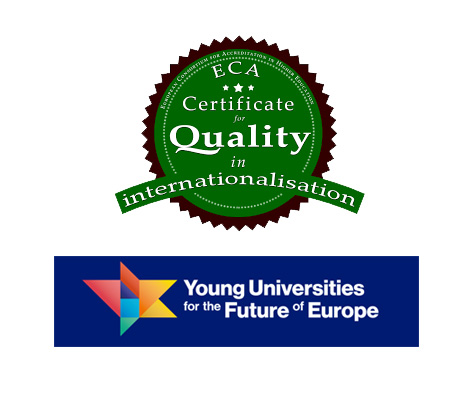‘Internationalisation is in our DNA’
As a university in a border region in the heart of Europe, we experience every day that the future also lies in Europe. A broad, pragmatic view of reality is needed in the debate on internationalisation that has intensified recently, with strong words and fearful images such as a 'tsunami of foreign students'. No, there is definitely no tsunami and yes, the arrival of young internationals offers significant benefits—not only for academic education and research, but for the entire country. Consider, for example, the growing personnel shortages in healthcare, education and technology.
The value of international students
The Dutch economy and the associated labour market are becoming increasingly international in character. The Netherlands cannot do without the ’carriers' of this internationalisation — Dutch citizens who, with a solid education and good language skills, focus on a career abroad and internationals who come to enrich the Dutch labour market. International students are a golden opportunity for the Netherlands in this respect. They are particularly important because of the experience they bring with them, the knowledge they gain about the Netherlands during their studies and the international network they build.
Nuffic estimates that international students contribute more than one and a half billion euros to the Dutch economy every year. Many of them stay in the Netherlands after their studies — 20% of them in Maastricht and its surrounding areas alone. Through a policy dedicated to this, the ‘stay-rate’ could be increased. But also those who leave the Netherlands play a vital role; they take the knowledge acquired about the Netherlands with them to new international destinations where they can act as ambassadors for further cooperation with the Netherlands. And what about the observation that many cities and regions in the Netherlands would be much less attractive without the social and cultural diversity that international students bring to them?

More information about:
Leading policy
Maastricht University (UM) has been profiling itself for years with its international orientation. With the support of the European Commission, UM has recently taken the reins of the Young Universities for the Future of Europe (YUFE), a pioneering alliance of eight top young universities that aims to facilitate the integration of higher education in the EU. The YUFE alliance has been the top-scoring alliance of the first call of the European University Initiative (EUI), having achieved 97/100 points in the evaluation of its application by the European Commission. Earlier this year, the prestigious Certificate for Quality in Internationalisation (CeQuInt) was awarded to UM as recognition of the quality of internationalisation in our education and the facilities that support this.
“We are considered to have a leading position when it comes to our international orientation“, says Prof.dr. Martin Paul, President of the Executive Board. “Moreover, knowledge has no boundaries and it would actually be crazy if a university were not international. We believe it is important that our students are able to prepare themselves optimally for an international future. The best way to do this is through intensive interactions with foreign students. I am proud that our policy is regarded as best practice in this area—and that more and more of our foreign ‘talents’ are now building careers at our Brightlands campuses.”
The Netherlands benefits from international talent.
Maastricht University attracts this talent.

Also read
-
In the upcoming months, we’ll share tips on Instagram for our students on how to live a healthier life. Not just a random collection, but tips based on actual research happening at our faculty. The brains behind this idea are Lieve Vonken and Gido Metz, PhD candidates at CAPHRI, the Care and Public...


